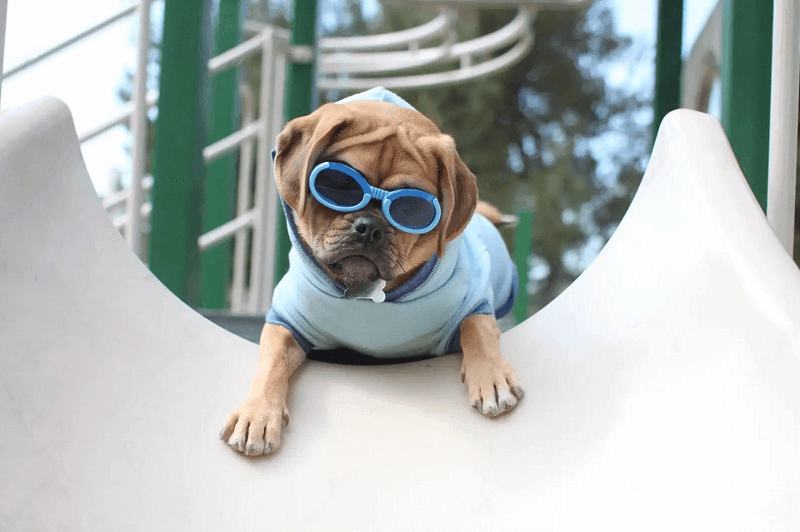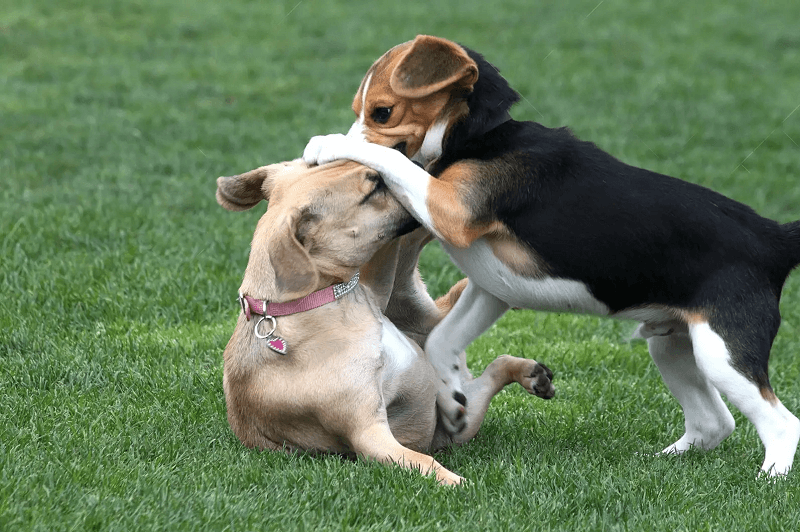Puggle dogs have a great temperament that is amiable, social, and affectionate with a hint of the Beagle’s hunting propensities. Learn more !
I. Puggle Personality Traits
1. History of the Puggle that affect their temperament
The history of the puggle has some interesting implications for their temperament. Puggles are a cross between a pug and a beagle, and were first intentionally bred in the 1980s by Wisconsin breeder Wallace Havens. Since then, they’ve become one of the most popular of the so-called designer dog breeds in the U.S. Their popularity exploded in 2005 when they set a record for the most widely-owned designer breed ever.

The history of the puggle is relevant to their temperament because both pugs and beagles are known for their friendly and outgoing personalities. Pugs are also known for being stubborn and willful, while beagles are known for being energetic and playful. As a result, puggle temperaments tend to be a mix of these traits.
Puggles are generally very friendly and outgoing dogs. They love to meet new people and other dogs, and they make great family pets. They are also very intelligent and easy to train. However, they can also be stubborn and willful at times, and they may have a tendency to bark.
Overall, puggle temperaments are generally good-natured and loving. They are great family pets and make wonderful companions. However, it is important to be aware of their stubborn streak and barking tendencies before bringing one home.
2. What is the Puggle temperament?
The temperament of a Puggle, which is a crossbreed between a Pug and a Beagle, can vary depending on the individual dog and the traits inherited from its parent breeds.

However, there are some general characteristics commonly associated with Puggles.
Here are some of the most common puggle personality traits:
- Friendly and outgoing: Puggles love to meet new people and other dogs. They are generally very social and make great family pets.
- Playful and energetic: Puggles are always up for a good time. They love to play fetch, go for walks, and run around.
- Affectionate and cuddly: Puggles love to cuddle and be around their people. They are very loyal and make great companions.
- Stubborn and willful: Puggles can be stubborn and willful at times. They may not always listen to commands, especially if they are not properly trained.
- Barky: Puggles can be quite barky, especially if they are not properly trained. They may bark at strangers, other dogs, or even just to get attention.
Puggles are often described as friendly, outgoing, and sociable dogs. They tend to be affectionate and enjoy spending time with their family members. Puggles are known to be good with children and often get along well with other pets in the household.
Due to their Beagle ancestry, Puggles may inherit some hunting instincts and may display a strong sense of smell. They might have a tendency to follow scents and explore their surroundings, so it’s important to keep them on a leash or within a securely fenced area when outside.
Puggles are typically intelligent and eager to please, which can make them trainable. However, they can also be somewhat stubborn at times, so consistent and patient training methods are recommended.
It’s important to note that individual Puggles can exhibit a range of temperaments, as with any mixed breed. Early socialization, proper training, and providing them with mental and physical stimulation are crucial to ensure they grow into well-rounded, happy dogs.
II. Tips for Dealing with a Puggle Temperament
Puggle temperaments are typically affectionate and kind. They make amazing family pets and companions. Before bringing one home, it’s crucial to be aware of their tendency to bark and stubbornness.
Here are some valuable tips for effectively dealing with a Puggle’s temperament:
- Socialization is key: Start early and expose your Puggle to various people, animals, and environments. This helps them develop confidence and adaptability, reducing the likelihood of behavioral issues.
- Positive reinforcement training: Puggles respond well to positive reinforcement techniques such as treats, praise, and rewards. Use these methods to teach them obedience commands, good manners, and proper behavior.
- Be patient and consistent: Puggles can be stubborn, so consistency is crucial. Set clear rules and boundaries, and enforce them consistently. Avoid harsh punishment as it can lead to anxiety or fear.
- Provide mental and physical stimulation: Puggles are intelligent and active dogs. Engage them in interactive play, provide puzzle toys, and take them for regular walks or play sessions to channel their energy and prevent boredom.
- Manage their hunting instincts: Beagle genes may give Puggles a strong prey drive. Use secure fences or leashes when outside, and provide supervised opportunities for them to explore scents in controlled environments.
- Seek professional help if needed: If you encounter behavioral challenges or struggle with training, consider consulting a professional dog trainer or behaviorist who can provide guidance and support.
Every Puggle is different, so it’s important to recognize this fact if you want to have a peaceful and rewarding connection with your pet.
III. Puggle – The Perfect Family Pet
When considering whether Puggle dogs are the perfect family pet, several factors need to be considered. First, Puggle temperament leans towards being friendly, sociable, and affectionate, making them generally good companions for families. Puggles often get along well with children and other pets, fostering a harmonious environment.

Energy levels, however, can vary among Puggles. Their Beagle ancestry may result in a moderate energy level, requiring regular exercise to prevent restlessness or destructive behavior. Active families who enjoy outdoor activities and are committed to providing daily exercise will find Puggles to be a good match.
Additionally, Puggles thrive on socialization and mental stimulation. Families willing to invest time and effort into training, socializing, and providing mental enrichment activities will reap the benefits of a well-adjusted Puggle.
Ultimately, the suitability of Puggle dogs as a family pet depends on the family’s lifestyle, commitment, and ability to meet their needs. While Puggles can be wonderful family pets, their specific requirements should be carefully considered. Families with limited time, space, or experience may find it challenging to meet the energy and socialization needs of a Puggle.
Puggle dogs can make wonderful family companions if their owners are prepared to give them the time, attention, and care they require. To decide whether a Puggle is the best fit for a household, nevertheless, it is important to consider its particular circumstances and skills.

